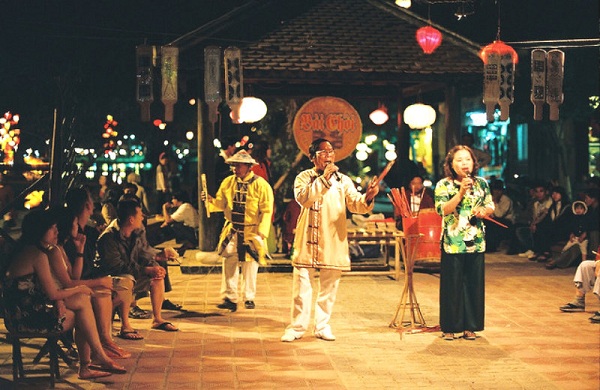Bai Choi singing receives UNESCO recognition
PSNews – A representative of UNESCO handed over a certificate to recognize the Bai Choi singing as an Intangible Cultural Heritage of Humanity to Minister of Culture, Sports and Tourism on May 4, in Quy Nhon.
- Da Nang fireworks festival tells legends of bridges
- PM drums to kick off Trang An Festival 2018
- Hue Festival 2018 kicks off with sparkling cultural colors
The ceremony saw the participation of Prime Minister Nguyen Xuan Phuc, Deputy Prime Minister Vu Duc Dam, leaders of ministries, sectors and provinces, and representatives of UNESCO Vietnam.
In his address, PM Phuc congratulated the artisans artists, compatriots and leaders of Binh Dinh province and along with 8 other provinces and cities of Quang Binh, Quang Tri, Thua Thien - Hue, Danang, Quang Nam, Quang Ngai, Phu Yen, Khanh Hoa on the recognition of the international community.
 |
| Source: Internet |
By recognising Bai Choi singing as an Intangible Cultural Heritage of Humanity by UNESCO, the world community reconfirmed Vietnam’s rich cultural heritage and acknowledged the country’s contributions to further enriching the cultural heritage of humanity.
Prime Minister Phuc called on people to join efforts in maintaining and preserving Bai Choi singing as it is now the common asset of the humanity. With 12 intangible cultural heritage recognised by UNESCO, Vietnam now ranks eight out of 177 member nations of the Convention for the Safeguarding of the Intangible Cultural Heritage.
At the ceremony, Minister of Culture, Sports and Tourism Nguyen Ngoc Thien announced the national action programme on protecting and promoting the intangible cultural heritage of Bai Choi singing.
Under the action programme, a series of activities will be implemented to promote and popularise the values of the heritage. On the occasion, 400 artisans and singers from nine central provinces with Bai Choi singing heritage joined an art performance programme, highlighting the establishment and development of Bai Choi singing.
Bai choi is often seen at local spring festivals and resembles a game, using playing cards and village huts. The stage for Bai choi performances encompasses nine cottages, each containing five or six ‘players’. One of the cottages, the central house, contains a troupe of musicians and instruments. A deck of playing cards is split in half, with one stack distributed amongst the players, and the other placed in the central house. The cards are stuck onto bamboo poles and erected outside the cottages.
The game singer delivers a flag to each cottage, all the while singing Bai choi, and then draws a card from the central house. Whoever holds the card closest in value to the game singer’s card wins. The Bai choi songs are about festivals, daily life and work, and are accompanied by musical instruments. The game and songs were developed by Mandarin Dao Duy Tu (1572-1634) to help locals protect their crops.

